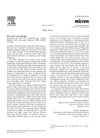92 citations
,
February 2005 in “Endocrinology” Estrogen receptors affect hair growth, with ER beta slowing down the hair cycle changes caused by ER alpha.
 50 citations
,
May 2004 in “Journal der Deutschen Dermatologischen Gesellschaft”
50 citations
,
May 2004 in “Journal der Deutschen Dermatologischen Gesellschaft” Estrogens generally inhibit hair growth and improve skin quality, but their exact effects on hair follicles are complex and not fully understood.
 44 citations
,
March 2004 in “Journal of Investigative Dermatology”
44 citations
,
March 2004 in “Journal of Investigative Dermatology” The effects of estrogen on human hair growth are unclear and need more research.
76 citations
,
January 2004 in “Journal of Investigative Dermatology”  3 citations
,
December 2003 in “Micron”
3 citations
,
December 2003 in “Micron” The book "Hair Science and Technology" provides a deep understanding of hair biology and genetics, discusses hair growth, density, and diseases, and offers methods for managing hair loss and caring for hair growth.
 130 citations
,
June 2003 in “Journal of Investigative Dermatology Symposium Proceedings”
130 citations
,
June 2003 in “Journal of Investigative Dermatology Symposium Proceedings” Estrogen Receptor ß (ERß) is the main hormone controller in human skin and hair follicles, not Estrogen Receptor α (ERα) or the Androgen Receptor (AR).
92 citations
,
July 2001 in “The FASEB Journal” Overexpressing the glucocorticoid receptor in mice leads to abnormal skin development and reduced inflammation.
71 citations
,
February 2000 in “Endocrinology and metabolism/American journal of physiology: endocrinology and metabolism” Estradiol stops hair growth in mice, but an antagonist can reverse this effect.
 66 citations
,
January 2000 in “Hormone Research in Paediatrics”
66 citations
,
January 2000 in “Hormone Research in Paediatrics” Androgens can both promote and prevent hair growth due to differences in gene expression in hair follicles.
 30 citations
,
December 1999 in “Journal of Investigative Dermatology Symposium Proceedings”
30 citations
,
December 1999 in “Journal of Investigative Dermatology Symposium Proceedings” Steroids, particularly estrogens and 5α-reductase inhibitors, affect blood vessel-related hair growth processes in hair follicle cells.
 32 citations
,
December 1999 in “Journal of Investigative Dermatology Symposium Proceedings”
32 citations
,
December 1999 in “Journal of Investigative Dermatology Symposium Proceedings” 17-β-Estradiol applied to the skin stops hair growth, while ICI 182 780 helps hair grow in mice.
 27 citations
,
April 1998 in “American Journal of Dermatopathology”
27 citations
,
April 1998 in “American Journal of Dermatopathology” Estrogen and progesterone don't directly affect hair growth in androgenic alopecia and alopecia areata.
 416 citations
,
September 1997 in “Journal of Investigative Dermatology”
416 citations
,
September 1997 in “Journal of Investigative Dermatology” People with hair loss have more androgen receptors and enzymes in certain follicles, with men and women showing different patterns.
154 citations
,
October 1996 in “Proceedings of the National Academy of Sciences of the United States of America” Estrogen affects hair growth and skin cell multiplication.
37 citations
,
June 1996 in “Journal of cellular physiology” Retinoic acid, glucocorticoids, and IGF1 increase IGFBP-3 production in human dermal papilla cells, affecting hair growth.
 124 citations
,
August 1994 in “Journal of Investigative Dermatology”
124 citations
,
August 1994 in “Journal of Investigative Dermatology” Dexamethasone speeds up hair loss in mice, while cyclosporin A slows it down.
124 citations
,
April 1992 in “Journal of Endocrinology/Journal of endocrinology” Beard hair follicles have more androgen receptors than non-balding scalp hair follicles.
 58 citations
,
June 1987 in “Archives of Dermatological Research”
58 citations
,
June 1987 in “Archives of Dermatological Research” EGF and FGF boost hair cell growth, hydrocortisone slows it, and minoxidil doesn't affect it.
37 citations
,
January 1975 in “Journal of Experimental Zoology” Epilation doesn't affect rat hair growth; thyroxine speeds it up, while estradiol slows it down.















